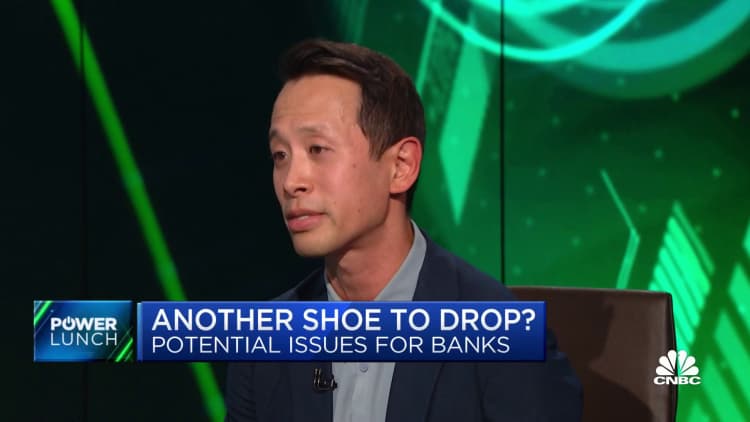An
automatic
teller
machine
(ATM)
at
the
Zions
Bank
headquarters
in
Salt
Lake
City,
Utah,
US,
on
Monday,
July
10,
2023.
Kim
Raff
|
Bloomberg
|
Getty
Images
A
trio
of
regional
banks
faces
increasing
pressure
on
returns
and
profitability
that
makes
them
potential
targets
for
acquisition
by
a
larger
rival,
according
to
KBW
analysts.
Banks
with
between
$80
billion
and
$120
billion
in
assets
are
in
a
tough
spot,
says
Christopher
McGratty
of
KBW.
That’s
because
this
group
has
the
lowest
structural
returns
among
banks
with
at
least
$10
billion
in
assets,
putting
them
in
the
position
of
needing
to
grow
larger
to
help
pay
for
coming
regulations
—
or
struggling
for
years.
Of
eight
banks
in
that
zone,
Comerica,
Zions
and
First
Horizon
might
ultimately
be
acquired
by
more
profitable
competitors,
McGratty
said
in
a
Nov.
19
research
note.
Zions
and
First
Horizon
declined
comment.
Comerica
didn’t
immediately
have
a
response
to
this
article.
While
two
others
in
the
cohort,
Western
Alliance
and
Webster
Financial,
have
“earned
the
right
to
remain
independent”
with
above-peer
returns,
they
could
also
consider
selling
themselves,
the
analyst
said.
The
remaining
lenders,
including
East
West
Bank,
Popular
Bank
and
New
York
Community
Bank
each
have
higher
returns
and
could
end
up
as
acquirers
rather
than
targets.
KBW
estimated
banks’
long-term
returns
including
the
impact
of
coming
regulations.
A
customer
enters
Comerica
Inc.
Bank
headquarters
in
Dallas,
Texas.
Cooper
Neill
|
Bloomberg
|
Getty
Images
“Our
analysis
leads
us
to
these
conclusions,”
McGratty
said
in
an
interview
last
week.
“Not
every
bank
is
as
profitable
as
others
and
there
are
scale
demands
you
have
to
keep
in
mind.”
Banking
regulators
have
proposed
a
sweeping
set
of
changes
after
higher
interest
rates
and
deposit
runs
triggered
the
collapse
of
three
midsized
banks
this
year.
The
moves
broadly
take
measures
that
applied
to
the
biggest
global
banks
down
to
the
level
of
institutions
with
at
least
$100
billion
in
assets,
increasing
their
compliance
and
funding
costs.

Invesco
KBW
Regional
Bank
ETF
While
shares
of
regional
banks
have
dropped 21% this
year,
per
the
KBW
Regional
Banking
Index,
they
have
climbed
in
recent
weeks
as
concerns
around
inflation
have
abated.
The
sector
is
still
weighed
down
by
concerns
over
the
impact
of
new
rules
and
the
risk
of
a
recession
on
loan
losses,
particularly
in
commercial
real
estate.
Given
the
new
rules,
banks
will
eventually
cluster
in
three
groups
to
optimize
their
profitability,
according
to
the
KBW
analysis:
above
$120
billion
in
assets,
$50
billion
to
$80
billion
in
assets
and
$20
billion
to
$50
billion
in
assets.
Banks
smaller
than
$10
billion
in
assets
have
advantages
tied
to
debit
card
revenue,
meaning
that
smaller
institutions
should
grow
to
at
least
$20
billion
in
assets
to
offset
their
loss.
The
problem
for
banks
with
$80
billion
to
$90
billion
in
assets
like
Zions
and
Comerica
is
that
the
market
assumes
they
will
soon
face
the
burdens
of
being
$100
billion-asset
banks,
compressing
their
valuations,
McGratty
said.
On
the
other
hand,
larger
banks
with
strong
returns
including
Huntington,
Fifth
Third,
M&T
and
Regions
Financial
are
positioned
to
grow
through
acquiring
smaller
lenders,
McGratty
said.
While
others
were
more
bullish,
KBW
analysts
downgraded
the
U.S.
banking
industry
in
late
2022,
months
before
the
regional
banking
crisis.
KBW
is
also
known
for
helping
determine
the
composition
of
indexes
that
track
the
banking
industry.
Banks
are
waiting
for
clarity
on
regulations
and
interest
rates
before
they
will
pursue
deals,
but
consolidation
has
been
a
consistent
theme
for
the
industry,
McGratty
said.
“We’ve
seen
it
throughout
banking
history;
when
there’s
lines
in
the
sand
around
certain
sizes
of
assets,
banks
figure
out
the
rules,”
he
said.
“There’s
still
too
many
banks
and
they
can
be
more
successful
if
they
build
scale.”

watch
now
Don’t
miss
these
stories
from
CNBC
PRO:
